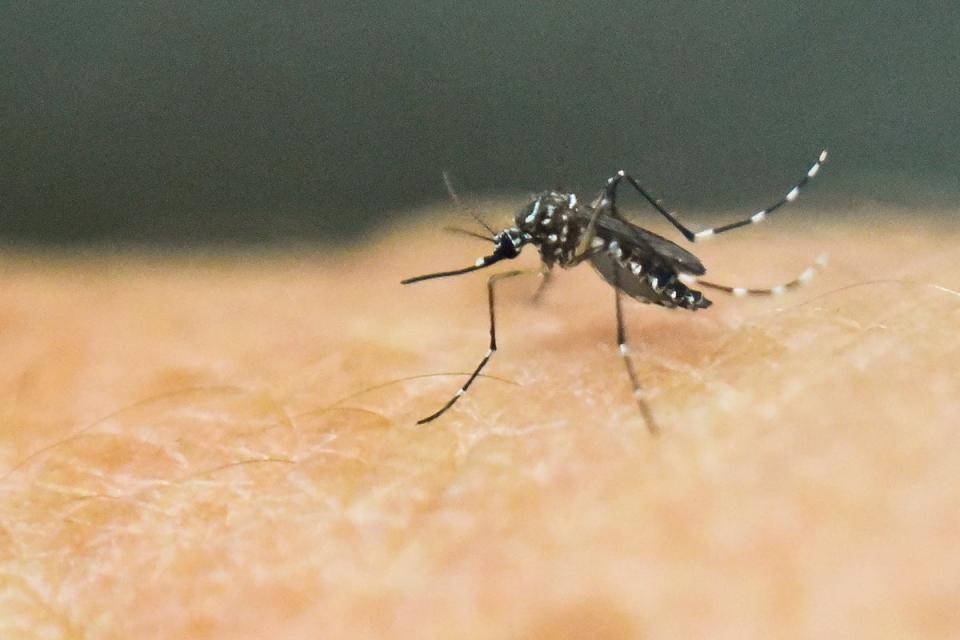DEET found to cause reproductive damage in worms, warranting further investigation, scientists say

A new study has found that DEET, the active ingredient in many mosquito and insect repellents, can be toxic to the reproductive health of worms - warranting further investigation into its potential impacts on humans, researchers said.
The peer-reviewed research from Harvard Medical School found that DEET had negative impacts on the reproductive systems of Caenorhabditis elegans, a species of worm with genetic similarities to humans.
However, DEET is one of the most effective products against mosquito bites because both its smell and taste repel the insects.
Last summer saw a spike in mosquito-borne diseases in the Americas including dengue and chikungunya, global health experts reported. And while investigation is ongoing, research has suggested that rising global temperatures due to the climate crisis are causing an increase in malaria cases.

Monica Colaiácovo, a genetics professor at Harvard who led the study, applied doses of DEET comparable to what’s found in human samples to the worms. Afterwards, Dr Colaiácovo and her team observed damaged DNA during meiosis, an early stage of reproduction.
“We saw this increase in DNA damage and errors in how the chromosomes are partitioned,” Dr Colaiácovo told The Independent.
The species of worm has several genes in common with humans and researchers often use it as a way to model human reactions, she said.
However, according to Daniel Swale, an associate professor in the Emerging Pathogens Institute and Department of Entomology and Nematology at the University of Florida, the study’s results can’t yet be extrapolated to humans. He said that people should continue to use DEET-based products to protect themselves.
“We have a suite of enzymes that can metabolize and break down that molecule that worms may or may not have,” Dr Swale, who was not involved with the study, told The Independent. “I think that we must be very careful when trying to extrapolate data from worms on humans.”
Dr Colaiácovo plans to conduct further research on the worms.
“We want to investigate how the DEET is being metabolized in the worm to see how it compares to how it’s metabolized in humans,” she said. “We also want to expand this to look at males because we only looked at females. We want to see whether we see similar or different results when we look at male meiosis.”
The genetics professor said that she also hopes to study the effects of DEET on mammals in order to have a more accurate model for its effects on humans.
According to Dr Swale, DEET remains a safe and effective way for people to protect themselves from mosquito-borne diseases.
“There have been billions and billions of doses applied directly to human skin over almost 70 years now, and there isn’t any absolute, definitive and direct evidence that we’ve had any issues with health when used appropriately,” Dr Swale said. “It’s actually a fairly safe molecule and it does what it’s supposed to do: Repel insects.”
Decades of research on DEET preceded Dr Colaiácovo’s study. In recent years, researchers have investigated whether the chemical is a neurotoxicant. Dr Swale, who has led research on the neurotoxicity of DEET, said his research has shown it poses minor risks but is largely safe when applied according to manufacturer instructions.
Last summer, the Centers for Disease Control and Prevention (CDC) recorded the first outbreak of locally-acquired, mosquito-transmitted malaria in the US since 2003. The CDC identified seven cases in Florida and one case in Texas between May and July 2023.
The jury is still out on how a rapidly-heating world might impact mosquito-borne diseases. A hotter environment can result in a decrease in mosquito-borne diseases, according to Richard Reithinger, a distinguished fellow in global health at RTI International. On the other hand, high humidity and precipitation can cause an increase in viruses.
“Right now, it’s not necessarily clear how climate change will impact mosquito-borne diseases — whether there is going to be a massive increase, a shift where certain diseases may occur, or even a decline in some regions,” Dr Reithinger told The Independent.
For those worried about what future research might find, Dr Colaiácovo said the best thing to do is to follow the manufacturer’s instructions when using repellent with DEET. Pregnant women may want to be “more aware of a potential issue,” she said, but that applying DEET spray to clothing rather than directly on skin can be a good solution.
“We do need to be able to have ways to protect the general population against these insect-borne diseases,” Dr Colaiácovo said.
“DEET is a very effective way to do that, but we do also want to make sure people are informed about what they may be doing,” she added.


